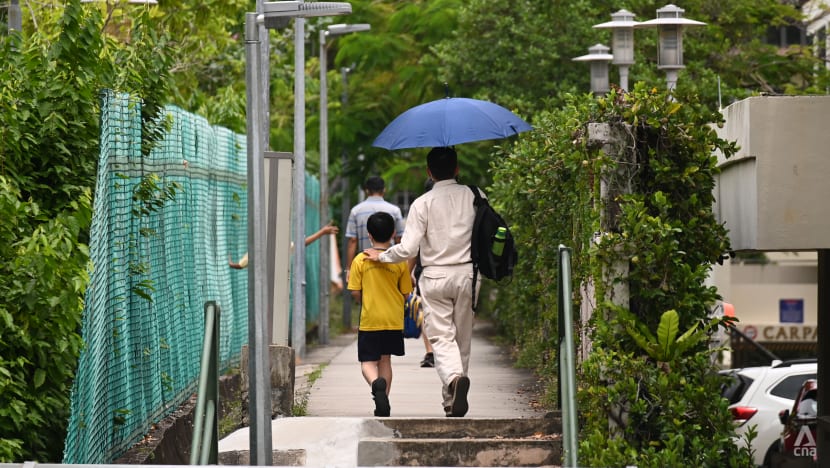Commentary: Scrapped year-end exams – kids rejoice but parents need assurances
The recent uproar over a particularly challenging PSLE Math question demonstrates how much exams – particularly the high-stakes ones matter but should they, asks mum June Yong.

A father seen with his child on Sep 14, 2021. (File Photo: CNA/Gaya Chandramohan)
SINGAPORE: The text messages came flooding in on Thursday (Oct 7) when the Ministry of Education announced final year exams for Primary 3 and Primary 4 children will be scrapped.
There were many whoops of joy, reports of children’s “dreams coming true” or doing cartwheels. Most parents too were in a celebratory mood. It was as if a big hurdle in the final race was lifted, and everyone could simply run to the finish line.
There was relief because there was no need to worry about the remaining chapters yet to be covered which during home-based learning (HBL) students were expected to self-study. Plus, there was no need to revise a year’s worth of work for the final papers.
In Singapore’s education system, exams are what an engine is to a good car. While exams have been removed for Primary 1 and 2 students, they remain the main mode of assessing understanding from Primary 3 onwards.
They are also a vital tool to differentiate learning ability – students who excel are placed in better classes and the Primary 4 year-end exams also determine if a child takes subjects at normal or foundational levels in Primary 5 and 6.
And then of course, there’s the biggest exam of them all, the Primary School Leaving Exam (PSLE) which remains the fundamental sorting mechanism for students to find their place in the next leg of their journey.
Despite the constant narrative that grades don’t matter or that soft skills and applied learning do, all parents want to ensure their children do well in exams and the thriving tuition industry moves everyone along.
LACK OF EXAM PRACTICE A CONCERN
Still, the revelry is only half the picture. I’m relieved that my Primary 4 child doesn’t need to sit for exams in this on-again, off-again educational climate.
As we have all come to realise, the year and a half of COVID-19 disruptions has meant that for a big chunk of our children’s school time, HBL has been in place.
The challenges are not minor – it is not easy to ask the teacher questions, there is hardly any interaction between teacher and pupil, tech issues and the lack of a conducive learning environment for the less fortunate all add up to the need for what the MOE has termed “curriculum recovery”.
So, when exams are taken off the table, there is relief that there is some acknowledgement of all those disruptions and that at this level, the lack of a final paper shouldn’t alter a child’s progress all that much.
Yet, there are niggling worries. Will my child develop the necessary exam skills and strategies if they miss out on major exams? And when the next one comes, will they be out of practice?
There are reports of tuition centres already preparing year-end papers for students, to fill the gap, so students and parents can know where they stand and how well they’ve grasped the topics at the end of the year. Some students have also prepared for final exams and don’t want to waste all that effort too.
There is also the added concern that schools will draw on school-based assessments conducted throughout the year to report on the child’s progress and make recommendations on whether they should take each subject at the standard or foundation level in Primary 5.
Some parents worry this may not be a fair assessment given the multiple disruptions this year, so teachers may find it harder to gauge a student’s performance.
A TIME TO RETHINK?
Yet, in light of these troubled times surrounding our families – from the uncertainties brought about by COVID-19 to the growing concerns over youth mental health – is it time to rethink the place of exams?
Do we really need a final and absolute score to determine how well the child has mastered the subject?
I have three children and my eldest has just finished her PSLE exams. Her brother is just two years younger but both their educational journeys – when it comes to exams – have been worlds apart.
Since Primary 1, my eldest girl has had exams. My 10-year-old, on the other hand, only took his first exam last year in Primary 3.
For my daughter, preparing for and sitting for a final exam is an annual rite of school passage and she is used to the rigour needed. For my son, even though his school has regular assessments to chart his proficiency, taking his first exam was unusual to him.
Because it was his first time, we spent time thinking about the areas that he needed more attention on and planning a revision schedule so he could be prepared.
I still remember him asking me: “Why do we need to study for exams? Why is it a big deal?”
I don’t remember my exact answer (it must have been something along the lines of exams are important), but it made me re-think the goals of education. Why should exams – at his age anyway – be the highlight (or lowlight) of his academic year?
A good score would be great, but I would much rather he enjoy learning, develop resilience when he came up against challenges and be disciplined to finish his tasks before he played.
One consolation that has emerged from this hybrid educational experience is that he has learnt to plan out his homework schedule by himself at home and can be trusted to attempt his own work before marking it.
It is not the perfect system and there is no tangible score for his behaviour, but if I was part of the assessments team at school, I would give these traits an A.
THE TOLL OF HBL ON LEARNING
It is no stretch of the imagination to say that all parents have been languishing over this two-week period of HBL, with some complaining that it has taken a toll on their wellbeing and family life.
Juggling work (often from home) and having to guide our children in understanding their schoolwork is nothing short of a tall order.
Throw in a couple of curved balls such as missing homework sheets or tantrums over limits placed on screen time, and you end up with the perfect setting for a parental meltdown.
Against this backdrop, the removal of year-end exams is almost like a godsend. In this pandemic, it allows so many of us to catch a breath, secure in the knowledge that our kids have come this far this year and they will move on to the next.
Perhaps the tougher question is what’s behind the stop-go dynamic of school closures and the announcement that HBL will end this week.
We know HBL affects families differently – some parents can’t even be at home when they must return to their workplaces and can’t change shifts at the drop of a hat, so this may come as a relief.
Education Minister Chan Chun Sing has reiterated that HBL is a “last resort”, so it may signal the return to normalcy, and allow teachers the time to catch up on curriculum time.
Still, I hope that we don’t waste this opportunity to recalibrate and focus on the big picture.
As parents and educators, we have already started shifting the conversation from grades to personal progress and the life-long journey of learning. So now is the perfect opportunity to walk the talk.
Yes, it is scary, yes, we need assurances that our children are meeting the necessary milestones, but the scrapping of exams allows teachers to think of how to engage our children rather than focus on testing them for a syllabus they’ve barely had a chance to master.
It also offers parents a unique chance to think about the childhood we want our children to have – the one that’s been somewhat “stolen” from them – how many missed friendships, recess and play dates they’ve had to endure.
Not having final exams this year is not a loss in my book. It offers all of us a much needed pause to truly confront the idea of learning, and help our children go further in life than exams can ever help them do.
June Yong is Lead of Insights at Focus on the Family Singapore and owner of MamaWearPapaShirt, a blog that discusses parenting and education in Singapore.


















